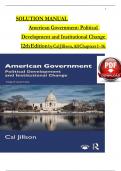1
SOLUTION MANUAL
American Government: Political
Development and Institutional Change
12th Edition by Cal Jillson, All Chapters 1 - 16
, 2
TABLE OF CONTENTS
1. Chapter v1 vThe vOrigins vof vAmerican vPolitical vPrinciples
2. Chapter v2 vThe vRevolution vand vthe vConstitution
3. Chapter v3 vFederalism vand vAmerican vPolitical vDevelopment
4. Chapter v4 vPolitical vSocialization vand vPublic vOpinion
5. Chapter v5 vThe vMass vMedia vand vthe vPolitical vAgenda
6. Chapter v6 vInterest vGroups: vThe vPolitics vof vInfluence
7. Chapter v7 vPolitical vParties: vWinning vthe vRight vto vGovern
8. Chapter v8 vVoting, vCampaigns, vand vElections
9. Chapter v9 vCongress: vPartisanship, vPolarization, vand vGridlock
10. Chapter v10 vThe vPresident: vExecutive vPower vin va vSeparation vof vPowers vRegime
11. Chapter v11 vBureaucracy: vRedesigning vGovernment vfor vthe vTwenty-First vCentury
12. Chapter v12 vThe vFederal vCourts: vActivism vversus vRestraint
13. Chapter v13 vCivil vLiberties: vOrdered vLiberty vin vAmerica
14. Chapter v14 vCivil vRights: vWhere vLiberty vand vEquality vCollide
15. Chapter v15 vGovernment, vThe vEconomy, vand vDomestic vPolicy
16. Chapter v16 vAmerica’s vGlobal vRole vin vthe vTwenty-First vCentury
, 3
Chapter v1
THE vORIGINS vOF vAMERICAN vPOLITICAL vPRINCIPLES
FOCUS vQUESTIONS
Q1 What vare vthe vbroad vpurposes vof vgovernment?
A1 The vancients vbelieved vthe vrole vof vgovernment vand vpolitics vwas vto vfoster
vhuman v excellence. vHowever, vit vis vimperative vto vremember vthat vthe vGreeks
vand vRomans v believed vthe vvirtuous vshould vrule vaccording vto vnatural vlaw.
vFurthermore, vvaluesof v equality vand vorder vwould vbe vserved vthrough va
vsociety vbased vupon vthe vrule voflaw vto v provide vfor vthe vcommon vgood. vIn
vthe vMiddle vAges, vgovernment vwas v largely vused v to vfacilitate vreligion vand
vmaintained vthe vneed vfor vthe vindividual vto vlive va vproper vlife v in vthe
vservice vof vGod. vThe vrole vof vgovernment vchanged vin vthe v early vsixteenth
v century vby vdownplaying vthe vrole vof vreligion vwhile valternatively v promoting
vthe vrole v of vlimited vgovernment vto vprotect vprivate vproperty vand v individual
vrights.
Q2 How vshould vgovernment vbe vdesigned vto vachieve vits vpurposes?
A2 According vto vPlato vthe vphilosopher-king’s vwisdom vand vintellect vwould vpromote
v order, vstability vand vjustice. vYet, vAristotle vtakes va vmore vrealistic vview vof
vAthenian v society vby vadvocating vthe vbest vform vof vgovernment vas va vpolity,
vwhich vcombined v oligarchic vand vdemocratic velements vto vproduce vpolitical
vstability. vThe vRomans v combined vmonarchical, varistocratic, vand vdemocratic
vprinciples vas va vmixed v government vwithin vrepresentative vbodies vlike vthe
vSenate vand vthe vAssembly vin v order v to vchampion vthe vcauses vof vboth vthe vrich
vand vthe vpoor. vGovernment vin vtheMiddle v Ages vwas vdetermined vthrough
vdivine vright, vwhereby va vmonarch vor vPope v was v ordained vby vGod vto vrule.
vHence, vwisdom vand vvirtue vrested vwithin vthese vfew v individuals vwho vgoverned
vto vpromote vreligious vlife vand vprotect vthe vreligious v establishment. vThe
vRenaissance, vProtestant vReformation, vand vEnlightenment v Periods vshifted vthe
vrole vof vgovernment vfrom vupholding vreligious vdoctrine vto v secular v concerns,
vsuch vas vprotecting vinalienable vrights, vincluding vprivate v property, vand
v promoting vcommerce. vIn vturn, vEnlightenment vpolitical
© v2023 vTaylor v& vFrancis
, 4
philosophers vlargely vappealed vto vindividualism vand vnot vreligious vhierarchy vas
vameans v to vprovide vorder vand vstability vin vwhich vindividuals vcould vflourish.
Q3 What vlessons vabout vgovernment vdid vcolonial vAmericans vdraw vfrom vthe vhistory
vofancient vGreece vand v Rome?
A3 Plato vwas vsuspicious vof vdemocracy’s vrule vof vthe vmany vbecause vgood
vgovernment v would vdecay vinto vmob vrule. vHence, vthe vpassions vof vthe vmasses
vneeded vto vbe v quelled v by vmore varistocratic velements. vWith vthis vproblem vin
vmind, vthe vFramers vofthe vU.S. v Constitution vreferenced vthe vinstitutional vdesign
vof vthe vRoman vrepublic vadhered vto v the vtradition vof vmixed vgovernment
vinitially vexpounded vby vAristotle v and vthe vRomans. v This vwas vmaintained vin
vthe vindirect vselection vof vboth vthe vSenateand vthe vpresidency v within vthe
vConstitution. vAristotle valso vadvocated vmixing varistocratic vand vdemocratic
v elements vin va vgoverning vstructure vcalled va vpolity. vIn veffect, vthis
vgovernmental vdesign v allowed vthe vfew vand vthe vmany vto vparticipate vin vthe
vpolitics vproviding van vorderly v society vwhere vthe vpoor vshould vbe vable vto
vselect v government vofficials vwho vwere vheld v accountable. vThis vwas valso vmade
vmanifest vinthe vConstitution vwith vits varistocratic-like v Senate vand vthe vmore
vdemocratic vHouse vof vRepresentatives. vThus vthe vAmerican v republic’s
vConstitution vestablished vinstitutional vpowers vto vgovern vaccording vto vthe v rule
vof vlaw. vWhile vthe vFramers vrejected vthe vreligious vhierarchy vof vthe vMiddle
vAges, v they vappealed vto vinalienable vrights vendowed vupon vevery vindividual
vby vGod, vper vthe v writings vof vJohn vLocke, vin vwhich va vjust vgovernment vand
vsociety vcould vnot vbe v impeded.
Q4 What vcircumstances vled vEuropeans vto vleave vtheir vhomelands vto vsettle vin vAmerica?
A4 Individuals vimmigrated vto vthe vcolonies vto vescape vreligious vpersecution vand
vcivil v unrest vafter vthe vEnglish vCivil vWar vand vto vpursue vsocial vand veconomic
v opportunities. v Colonists venjoyed va vvast varray vof vnatural vresources vand va
vlarge v geographical varea v where vfreedom vof vreligion vand veconomic
vopportunity vflourished. vAlso, vtheir v heterogeneous vsocial vcomposition vas vwell
vas vcontinual vpromotion vof videals, vsuch vas v equality vand vtolerance, vtended vto
vpromote vpolitical vfreedom vat vthe vsame vtime vthat v social vexpansion vof vthe
vpopulation vwas voccurring.
Q5 What vdid vdemocracy vmean vto vour vcolonial vancestors, vand vdid vthey vapprove vit?
A5 The vcolonists vwere vskeptical vof vdemocracy vand vviewed vthis vtype vof
v governing v authority vas vmob vrule. vSociety vwas vlargely vseen vas vsegmented
vinto vthose vwho v should v rule vand vthose vwho vshould vnot. vIn vfact, vthe vFounders
vbelieved vthat vthe velite v(well- v educated, vland vowners) vshould voccupy
vpositions vof vleadership. vThus, v an varistocratic v element vwithin vgovernment vwas
vnecessary vto vprotect vagainst vthethreat vof vmob vrule v historically vassociated
vwith vdemocracy. vFundamentally, vthe videa vof vrepublicanism v was vpromoted
vas van videal vat va vhigher vlevel vthan v democracy. vThis vwas vmade vmost
v manifest vin vthe vtendency vto vprefer vmixed
© 2023 Taylor & Francis




